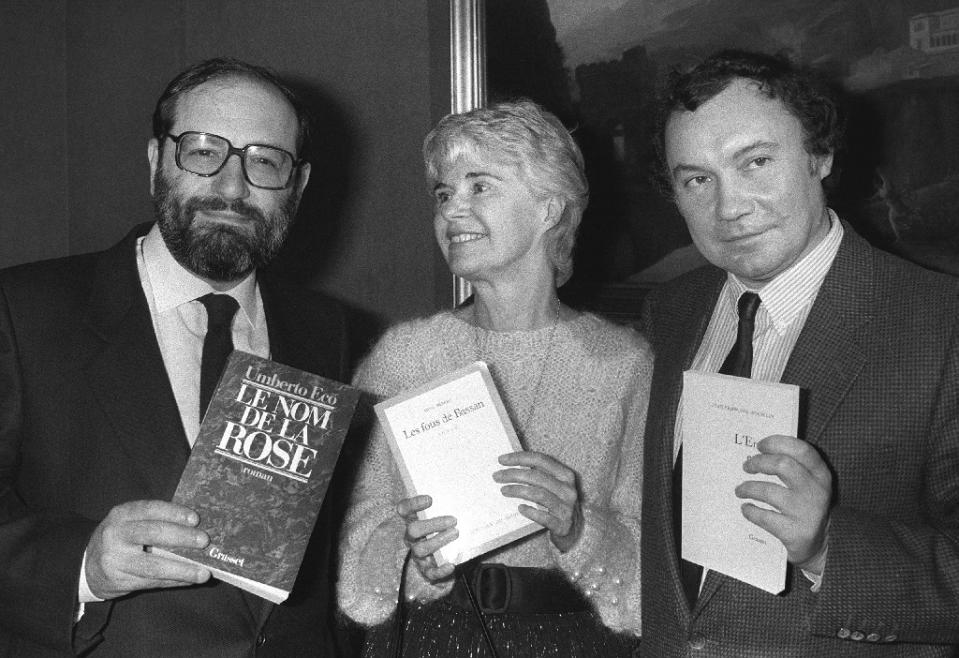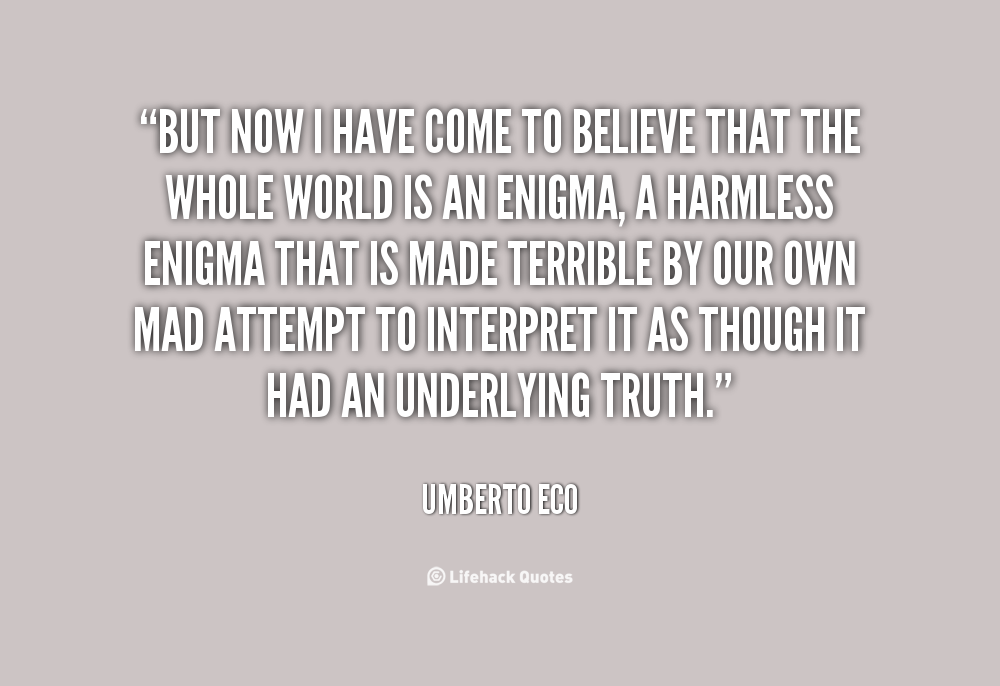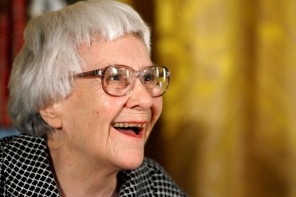The author should die once he has finished writing. So as not to trouble the path of the text.
Writer, philosopher, intellectual and literary critic, Umberto Eco, Italy’s much loved author, succumbed to pancreatic cancer at the age of 84 on February 19.
The world remembers him as the author of the book, The Name of the Rose, but, indeed, he was so much more than that. Born to an accountant father on January 5, 1932 in northern Italy, who desired that his son choose law as a profession, Eco’s creative side was more dominant than any other and he, thus, decided to study philosophy and literature from the University of Turin.
He has suggested that his surname is an acronym of the phrase ex caelis oblatus which in Latin means, “A gift from the Gods” or “donated by the heavens”; it was given by the official who recorded the birth of his grandfather, who had been abandoned by his parents.
A gift from God, he definitely was.
He published his first book The Name of the Rose (Il nome della rosa) in 1980, which was translated from Italian to English in 1983, with several other languages following suit later. The book, a historical murder mystery which includes several semiotic operations, was adapted into a film by the same name in 1986.
The Name of the Rose could very well be his most famous novel, which catapulted him to international fame, but he has also written other brilliant works like Foucault’s Pendulum (Il pendolo di Foucault), The Island of the Day Before (L’isola del giorno prima), The Mysterious Flame of Queen Loana (La misteriosa fiamma della Regina Loana), The Prague Cemetery (Il cimitero di Praga), and most recently, Numero Zero, which was published in 2015. The ideas and concepts used in his books are complex, intricate, dense and many a times hard to understand, but his readers are enthralled and captivated by both his stories as well as his story telling, devouring hungrily each book that he has published.
Apart from this, he has over 20 works based on semiotics, the study and interpretation of signs and symbols, and is known for making the concept reach a much larger audience than anyone before him. He has also written several texts related to academics and studies, books for children and several theses.
Image courtesy – LifeHack
Eco was one of the rare individuals who with ease overstepped the boundaries of an academician as well as a writer – remarkably. He was intellectual, spiritual and philosophical, yet very realistic about the world. His book “How to Write a Thesis” is meant for students as a guide to help them in academics, but explains the concept in a approachable, friendly way that anyone can use to enhance their writing skills. To gauge the true brilliance of his tips, you can view Eco’s advice to writers and how to write more efficiently, here.
So when on 19th February, news broke out that he had passed away, so many of us could not believe this was true. Praying that it was a hoax but eventually grasping that the news, indeed, was real, the world was devastated at the loss of an ingenious soul, an individual with a mind that this physical realm has not seen in a long time. The Internet was flooded with obituaries, people expressing their sorrow.
Annalisa Merelli, a former student of the University of Bologna, which people associate with Eco’s name, decided to pursue her education in Communications from Bologna only because of the professor’s reputation. Such was his name that people would never doubt the quality of the education imparted at the university. She says,
I only saw the professor a handful of times, but whenever it happened I was bewildered by his joyous, playfully big personality, and overwhelmed by the vastness of his knowledge and of his insatiable thirst for it. As a colleague once described him, he was “excessive—for culture and generosity”. He knew everything, about everything. He was exceptional in making very complex things clear and approachable, which is why his essays are such a gift to the curious mind. He embodied the definition of a bright mind.
Natalya Avetisyan, editor-in-chief of Slovo publishing house, that published four of his books, agrees and reinforces what Merelli has to say. She says,
… He was really light in conversation, always full of ideas, and had a rare trait – he appreciated people he worked with … I think this is a big loss for the whole intellectual and cultural world.
Other people who have had the fortune to meet him in person have similar opinions of him. Anton Dolin, a film critic, says,
[in 1998] every Russian resident who could read know Eco’s name and almost everyone read his books. The halls where he gave lectures were full of people – he talks about the internet, about interpretation and its limits … I was shocked how easy (sic) he spoke other European languages, and of course his unique sense of humour.
Image courtesy Popopics
Twitter was filled with messages that ranged from disbelief to disappointment and grief. It was not just stars and writers that expressed sorrow and unhappiness, but the entire Twitter community voiced shock and hoped his soul with rest in peace.
Kristina Georgieva, a Bulgarian economist and vice-president of the European Commission, tweeted, ““People are tired of simple things. They want to be challenged.” Umberto Eco gave plenty to be challenged with. A giant is gone! R.I.P.”
Merelli tweeted about him as well. She posted, “Umberto Eco’s bright intelligence was beyond anything imaginable. I feel so privileged to have witnessed it. What a loss. Grazie, professore.”
Elizabeth Breunig, a writer at News Republic, said “Along with being a witty, sharp essayist, Umberto Eco wrote more movingly about religious feeling than almost anyone else I’ve ever read.”
But most of all, his native country, Italy was in mourning.
“[He was] an extraordinary example of a European intellectual, combining unique intelligence of the past with a limitless capacity to anticipate the future,” Italian Prime Minister Matteo Renzi said about Eco. “It’s an enormous loss for culture, which will miss his writing and voice, his sharp and lively thought, and his humanity.”
Dario Franchesini, the culture minister of Italy, said Eco was “a mater who brought Italian culture to the whole world.”
La Repubblica, the newspaper where Eco frequently wrote, “The world has lost one of the most important men in contemporary culture.”
Several other newspapers also expressed their sorrow and unhappiness on that unfortunate day.
Image courtesy – Like Success
In reality, it is not just Italy, but the whole world that has lost a celebrated author, an extraordinary intellectual, a bright, talented man.
He once said, “We have a limit, a very discouraging, humiliating limit: death”
Truth is, he is limitless, infinitely in our hearts. He gave the world much to think about, dream about, care about. Though his physical presence may not be with us anymore, his thoughts, his words, his ideas and he himself will always be in our minds.
RIP, Umberto Eco. May your soul always rest in peace.

















